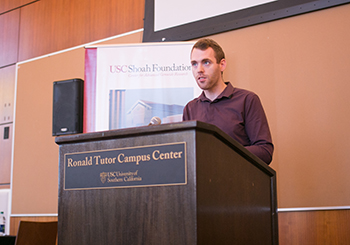Behind the Music: Matt Lawson Reflects on “Singing in the Lion’s Mouth: Music as Resistance to Genocide”

 Musicologist Matt Lawson came to “Singing in the Lion’s Mouth: Music as Resistance to Genocide” conference hoping for feedback on one of his newest research ideas, and he wasn’t disappointed.
Musicologist Matt Lawson came to “Singing in the Lion’s Mouth: Music as Resistance to Genocide” conference hoping for feedback on one of his newest research ideas, and he wasn’t disappointed.
Lawson recently submitted his PhD thesis at Edge Hill University in England, focusing on the music used in German depictions of the Holocaust on screen. But at USC, he chose to present on a topic that he is just beginning to explore. He spoke about whether the music in films that depict the Holocaust and other genocides can be considered a form of resistance in itself, using examples from the films Schindler’s List, The Grey Zone and Night and Fog.
Lawson concluded that he has a difficult time accepting film music as an act of resistance since most films about genocide are made years after the genocide is already over. He then asked the other scholars in attendance what they thought, prompting a lively discussion about the definition of resistance and the role of film composers in depicting genocide through cinema.
Though his ideas were met with some resistance (no pun intended), Lawson said he was grateful for the opportunity to step outside his comfort zone and receive feedback from the other scholars. This was incredibly productive for him, he said, especially because the conversation was very open-minded and in-depth. Not all academic conferences enjoy such a supportive atmosphere.
Academia, he pointed out, is not just about answering questions but asking them. The symposium provided all the attending scholars an important outlet for collaboration and debate.
“Rather than sit at home and wonder whether this was a viable avenue of research, what better way to ask a room full of academics what they think?” Lawson said. “Sometimes, we become so entangled with our own ideas, that we cannot see the bigger picture and worth of what we are doing. Publicly and candidly trying out new ideas in front of fellow academics can offer an insight not possible when confined to your home or office.”
Lawson said he was impressed by the variety of papers that the other scholars presented, especially given the relatively narrow focus of the conference. The papers covered vastly different topics, from film music to forbidden songs, and covered genocides from around the world, yet he found them all relevant to his own research. He realized just how many research possibilities there are in this field.
“I think the workshop must be seen as a starting point, and I would certainly welcome another similar event in the future, whether that be at USC or elsewhere,” he said. “I feel music is such an understudied aspect of any genocide, that it would be a shame to not pursue it.”
Lawson praised the conference organizers and staff for such a comprehensive, thought-provoking event. The concluding concert was especially moving, he said, and the experience of hearing real resistance songs from the Holocaust and other genocides performed by the student musicians will stay with him for a long time.
“To have the opportunity to visit California to present my research is a privilege which was not lost on me, and I feel that new doors of opportunity have been opened by the networking achieved over the course of the weekend,” Lawson said.
Like this article? Get our e-newsletter.
Be the first to learn about new articles and personal stories like the one you've just read.